When you embark on a Kilimanjaro climb with Kiliclimb Africa Safaris, the food you consume plays a crucial role in powering your journey. Regardless of the Kilimanjaro route you choose, maintaining the right diet can significantly improve your climbing experience and success rate.
A well-balanced diet also helps alleviate symptoms of various ailments, including altitude sickness. Let’s explore why proper nutrition and hydration are vital at high altitudes:
Essential Energy Source
The food you eat provides the energy needed for the physically demanding climb up Mount Kilimanjaro. Meals should be rich in carbohydrates, the body’s primary source of energy, to keep you fueled throughout your ascent.

Hydration Maintenance
Adequate water intake is vital for staying hydrated and helping prevent altitude sickness while climbing Kilimanjaro’s majestic peaks.
Boosting Metabolism
At high altitudes, your metabolic rate increases, causing your body to burn calories faster. Therefore, it’s important that your Kilimanjaro meals are high in calories to meet your elevated energy needs.
Managing Altitude Sickness
Proper nutrition and hydration can also help reduce the symptoms of mild altitude sickness, a common issue among climbers. While not usually dangerous, altitude sickness can impact your climbing performance, making good food and hydration essential for a successful climb.
When you climb Kilimanjaro with Kiliclimb Africa Safaris, you’ll be supported by a dedicated mountain crew that ensures your daily needs are met. Our experienced team includes a skilled cook and an assistant, both experts in preparing delicious and nutritious meals for your adventure. Our unique meal plan includes three substantial meals each day, along with snacks and hot drinks. Here’s what you can expect from our Kilimanjaro food offerings:
An energizing breakfast is crucial for fueling your climb. Our morning menu features:
To keep you satisfied until lunch, we provide hot beverages and biscuits—ideal snacks for the climb.
Our approach to lunch varies by day:
After reaching camp, we serve a light pre-dinner snack including hot beverages, popcorn, and biscuits—perfect for a Kilimanjaro climb.
Dinner: At the end of an exhilarating day, enjoy a hearty dinner that varies nightly. Dishes may include spaghetti with chicken and vegetables, beef with potatoes, or spinach-stuffed avocados.
At Kiliclimb Africa Safaris, water is just as essential as the food you’ll enjoy during your Kilimanjaro ascent. Our dedicated mountain staff collects water from local streams and purifies it with tablets, which might slightly alter its taste. Staying hydrated is crucial for a successful climb, and we recommend drinking at least three liters of water each day. If flavored infusions help you drink more water, feel free to use them!
During your daily treks, you'll need to carry your own water. We suggest bringing two types of containers:
To prevent your water bottle from freezing, consider storing it in a sock and keeping it close to your body, or store it upside down. For additional packing tips, consult our Kilimanjaro Packing List to enhance your climbing experience.
Carbohydrates are crucial for endurance, especially on the demanding climb up Mount Kilimanjaro. They:
Our Kilimanjaro food menu is designed with a focus on carbohydrates like rice, pasta, and potatoes. At high altitudes, the body naturally relies more on carbohydrates because proteins and fats are less efficiently absorbed. Ideally, carbohydrates should make up 60% or more of your calorie intake. A high-carb diet not only fuels your climb but also aids in altitude acclimatization and can help alleviate symptoms of acute mountain sickness (AMS).
While our Kilimanjaro Climbing Packages provide a variety of meals and snacks, bringing some of your favorite snacks can be beneficial. They offer quick energy and a morale boost during challenging parts of your climb. Consider packing:
Ensure your snacks are packed in resealable, reusable bags to comply with Tanzania’s ban on single-use plastic bags. Organizing your snacks by day can also help streamline your eating during the trek.
In addition to snacks, consider bringing: - Electrolyte Packets:Gatorade, Nuun, or Rehidrat
These items can enhance your experience by addressing any changes in water taste and providing extra comfort.
To ensure a successful Kilimanjaro climb, keep these tips in mind:
Kiliclimb Africa Safaris: Fueling Your Kilimanjaro Adventure
Ascending Mount Kilimanjaro is a grand challenge that demands not only determination but also the right nourishment. At Kiliclimb Africa Safaris, we understand the crucial role that food and water play in your climb—mentally, physically, and emotionally. Our mission is to ensure that you are well-fed and energized throughout your journey to Uhuru Peak.
The food you eat on Kilimanjaro serves as the fuel for your ascent. Proper nutrition and hydration can significantly enhance your climbing experience and help mitigate altitude sickness. Here’s why good food and water are vital:
Our skilled mountain crew, including a seasoned cook and assistant, are dedicated to preparing delicious and nutritious meals. Here's a snapshot of what you can expect:
Kilimanjaro - Useful Information
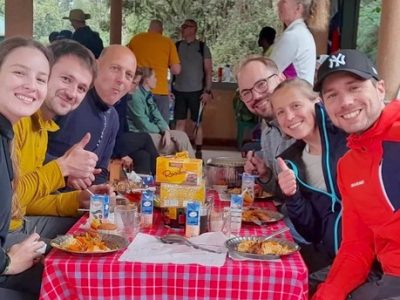
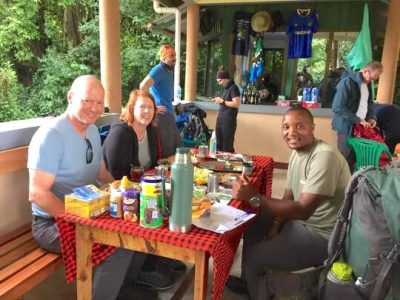
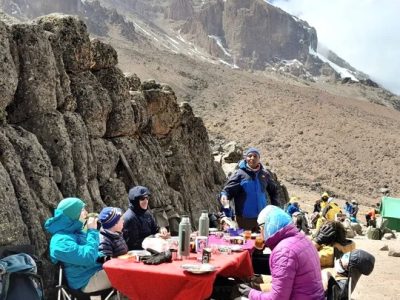
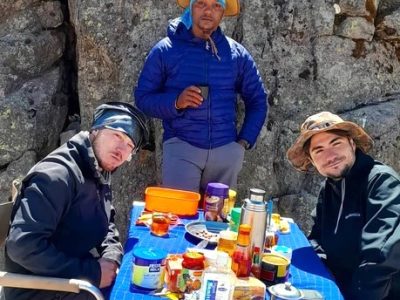
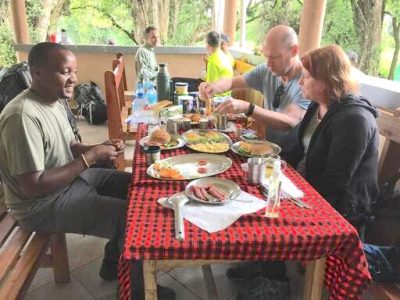
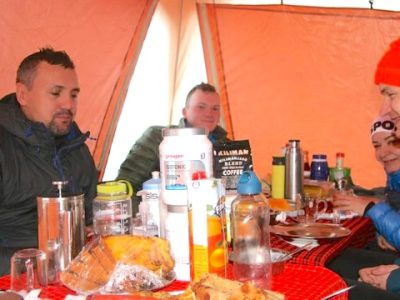
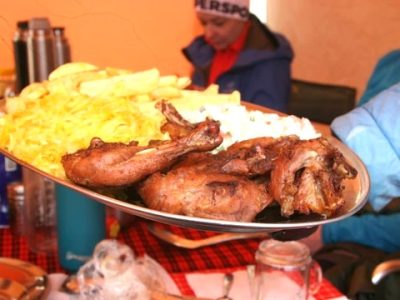
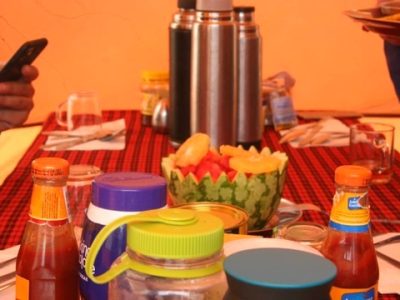
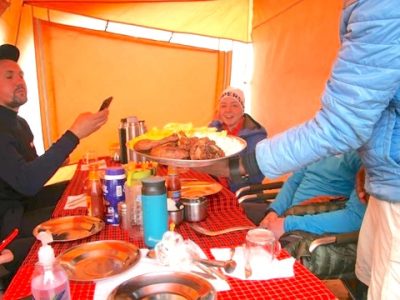
Day 1 on Kilimanjaro
Day 2: on mountain Kilimanjaro
Day 3: on Mountain Kilimajaro
Day 4: on Mountain Kilimanjaro
Day 5: On Mountain Kilimanjaro
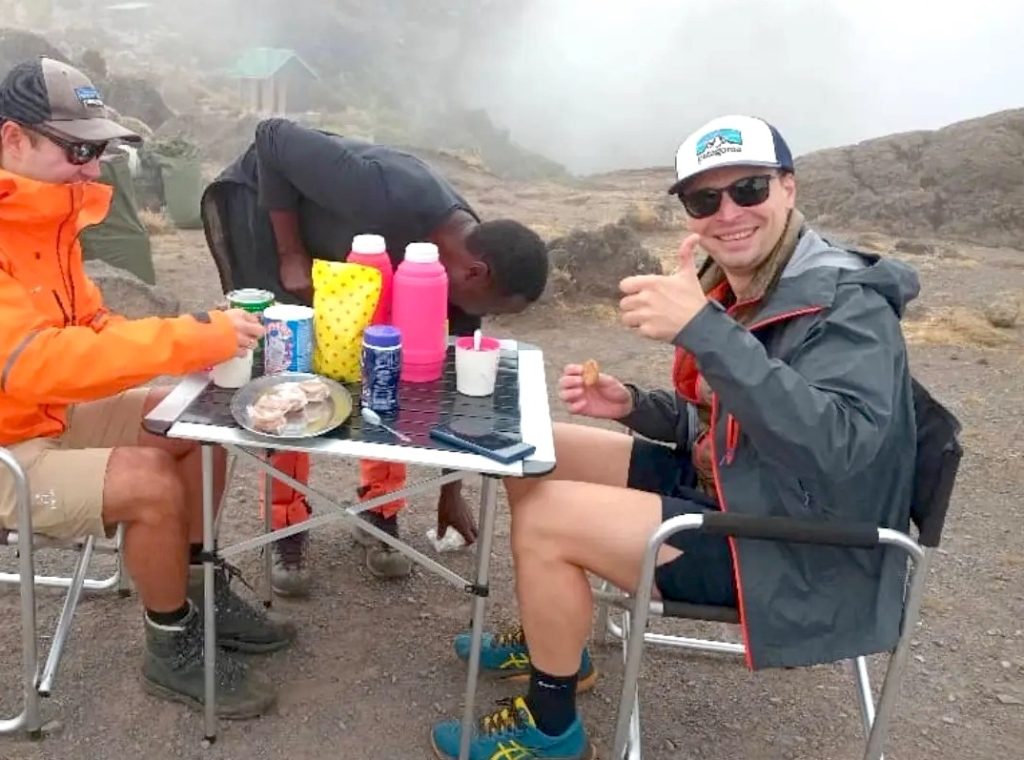
Snacks: While our packages include meals and snacks, bringing your favorite snacks can be beneficial. Ideal options include trail mix, candy bars, dried fruits, protein bars, and biscuits. Pack snacks in resealable, reusable bags to comply with Tanzania’s ban on single-use plastics.
Drinks: In addition to water, consider packing electrolyte packets (Gatorade, Nuun), flavor-enhancing sachets, and preferred herbal tea bags.
Snacks to Avoid: Avoid caffeinated snacks, alcohol, bulky foods, potential leak hazards, and perishable items unless consumed on the first day.

Fresh Food on Kilimanjaro
Our dedicated resupply runners ensure you have access to fresh produce even on extended expeditions. For instance, on the Lemosho route, fresh provisions are delivered to the Karanga Camp around day five, allowing you to enjoy fresh meat, fruits, and vegetables throughout your climb.
Experience the Kiliclimb Africa Safaris Difference
With Kiliclimb Africa Safaris, you can be confident that your Kilimanjaro food and hydration needs are well-cared for, enhancing both your climbing experience and overall adventure. For more information on our Kilimanjaro Climbing Packages and food services, refer to our Kilimanjaro Food Price List and Packing List.
Fuel your Kilimanjaro adventure with us—experience the difference in every bite!
What our Client Say
EXCELLENTVerified The best, most thoughtful and memorable hiking tour I went with my dad on the 8 day Lemosho Route Kilimanjaro climb with Kiliclimb, and Moses and his team put together an absolutely incredible trip! Everything was flawless from start to finish, from the organization and service to the guides, crew, and overall experience.Our guides (Baraka and Godson) were the best and genuinely so kind and caring, checking in constantly and even doing daily wellness checks. They provided daily briefings and always clearly communicated what was ahead. What stood out to me even more was hearing the guides talk about how great Moses is and how much they enjoy working for him. That says a lot about the company and, in my opinion, really matters when choosing an outfitter!The food was spectacular the entire trip and clearly planned with altitude in mind. We had the best soup every day, plus amazing fish, chicken, beef, and yes, even pizza! The whole team was remarkable and so tuned into our needs, including setting up a private bathroom tent, which was a huge comfort.Moses went above and beyond personally as well. Before the trip, he reviewed my gear and flagged that I did not have warm enough layers for summit day, then loaned me a jacket and pants so I was properly prepared. He also arranged transportation to and from the airport, making it truly feel like a full package experience.I could not have asked for a better Kilimanjaro climb, and I highly, highly recommend Kiliclimb to anyone considering the mountain!Posted onVerified Kili, wow I did it. Großartige Tour mit einem tollen Veranstalter. Sehr gute Betreuung von einem perfekt vorbereitetem, zuverlässigen erfahren Team. Kann ich nur empfehlen, war sehr spaßig und voller neuer, schöner Eindrücke trotz Anstrengung, die eine Tour auf einen 5895 Meter hohen Berg, mit sich bringt.Posted onVerified Great communication, reliable service, good value for money and an unforgettable Kilimanjaro tour. Our Kilimanjaro tour was an incredible experience, made truly unforgettable by a mature, highly reliable, trustworthy, friendly, positive, and very experienced team.”Posted onVerified The best Guide for Kilimanjaro and safari in Africa My friend and I did 6 days Kilimanjaro Climb via The Machame Route for 6 days and The whole Team was Super Helpful and Friendly from Answering our queries 24/7 available to Day one to day 6 everything went really Smoothly and professionally!! We got Top notch Service and you could tell that they really care and passionate about their job !! I would highly recommend this company to anyone who wants the best experience in Tanzania and on mountain KilimanjaroPosted onVerified Amazing Local Company A friend and I went on a 4-day private safari through Tarangire, Ngorongoro Crater, and the Serengeti, and it was absolutely incredible. From start to finish, the Kiliclimb staff exceeded our expectations. After completing our Kilimanjaro trek, we were staying at a hotel in Arusha and were greeted by the team and picked up directly from the hotel, which made the transition seamless and stress-free.We were incredibly lucky to have Ombeni as our guide. Thanks to his deep knowledge of the parks and strong relationships with other guides and rangers, we saw every animal we hoped for. He constantly checked in with us, asking for feedback and what we wanted to focus on each day, which made the experience feel truly personalized.Ombeni was funny, kind, and genuinely made the trip unforgettable. And don’t sleep on his photography skills, he’s seriously talented! We couldn’t recommend this local company more. They also gave us t-shirts and safari hats which was a nice touch!Posted onVerified Unforgettable 4-Day Adventure – Onbeni is a Legend! Our 4-day trip through the Serengeti, Ndutu, and Ngorongoro was the highlight of our travels, and that is entirely thanks to our guide, Onbeni.From the start, Onbeni brought a high-energy, positive vibe that made every game drive an adventure. His "superpower" is undoubtedly his eyes—his ability to spot wildlife is incredible. The absolute highlight was when Onbeni was the first to spot a rare leopard, giving us a private viewing before any other vehicles arrived!We also spent an unforgettable time driving alongside the Wildebeest migration, witnessing the magic of the newborn babies in Ndutu. Onbeni’s professionalism and deep knowledge of the land made us feel safe and informed throughout. If you want a guide who is professional, energetic, and has a "sixth sense" for finding animals, ask for Onbeni!Posted onVerified 5/5 stars! 5/5 stars! This Tanzania safari local agency made our trip absolutely unforgettable. Our guide was super knowledgeable about wildlife—we spotted the Big Five smoothly and he shared fascinating facts about animals and local culture. The 4x4 jeep was comfortable, transfers were on time, and the lodges were clean with great food. No hidden fees, flexible schedule, and the team cared about every detail. 100% recommend for an amazing African safari experience!Posted onVerified Great experience! Kiliclimb organized an extremely wonderful safari overall. Our expectations were exceeded by far. From the organization, to the hospitality, to the experiences, accommodations, and personal relationship with our guide Ombeni. Ombeni did an outstanding job. He knew every national park very well and knew exactly where we could observe animals. He was very friendly and always responded to our needs. You couldn't ask for a better guide than Ombeni at your side. Communication with the Kiliclimb management also worked wonderfully. We would recommend a safari with Kiliclimb at any time. Asante sana!Posted onVerified Once-in-a-lifetime experience Our safari tour was a unique experience! We didn't expect to see so much! We saw the Big Five, we saw a wildebeest migration, we saw the birth of a wildebeest calf and much more. Our guide, Ombeni, accompanied us for seven days and made so much possible for us. His flexibility, warmth and knowledge were invaluable. We felt very comfortable and highly recommend Kiliclimb! Thank you for everything. Asante sana!Posted onVerified Unforgettable 7-day safari with Kiliclimb Safari – highly recommended! Our 7-day personalized safari with Kiliclimb Safari was simply fantastic and exceeded all our expectations. Thanks to our great guide Ombeni, the best guide you could wish for, we saw and learned an incredible amount. Every day was a new highlight!The tour was superbly organized, everything ran smoothly and professionally. The contact with Janeth via WhatsApp was particularly good. She was always available, extremely helpful, and always responded quickly and friendly. You feel well taken care of from the very beginning.We would book this safari again anytime and can recommend Kiliclimb Safari and Ombeni 100%. A unique experience that we will never forget!







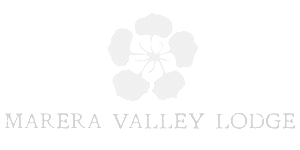

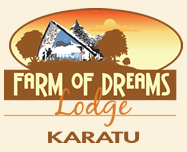
+255 768 735 700 (Managing Director)
+255 764 117 423 (Founder & Expert Guide)
